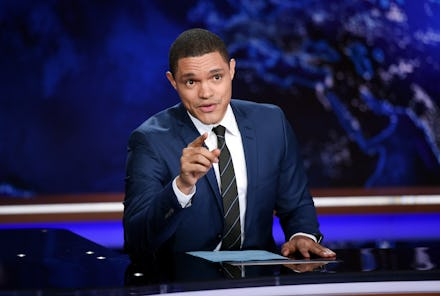Here's How Late-Night TV and the Internet Fuel an Essential Pop Culture Feedback Loop

It's not a secret that you don't need to stay up late to catch the latest late-night TV bits. Many — if not most — people now catch late-night clips on their phones on the way to work or at their desks once you're there.
That's because recaps and shares of videos from Stephen Colbert, Jimmy Fallon, Trevor Noah and Samantha Bee — among other trusted names in news — have come to dominate morning feeds and daily conversations. With the rise of social media and ubiquitous broadband video, anytime late-night TV has become an essential component of millennials' online diet.
The Tonight Show Starring Jimmy Fallon on NBC and Jimmy Kimmel Live on ABC bring in millions of viewers a week, according to Nielsen, but the creators and producers know that ratings no longer accurately reflect how many people are watching. Both Kimmel and Fallon have millions of fans on Facebook and YouTube, over and above their regular viewing numbers. Segments of last night's shows easily and often become today's viral videos.
Online news websites, Mic included, routinely look for the most shareable clips from late-night comedians and help them spread on the internet. Andy McDonald, editor of the Huffington Post Comedy, regularly writes up short takes of late-night video clips in his section.
"We are in this age of binge-watching shows and watching TV when we want to, not when it airs," McDonald said in a phone interview. "The days of sitting up until 10:30 or 11:30, it's just not the way that people watch TV anymore."
As those write-ups and shares gain momentum online, they enter a relentless feedback loop satirizing the absurdity of current events. Jon Stewart — whose tenure as host of The Daily Show arguably created that loop — poked fun at the hyperbole of this online conversation in his penultimate episode when he cited accounts of how he had "eviscerated" and "destroyed" ISIS, the big banks and Fox News.
"That's mostly what we look for: late-night responding to politics," McDonald said. "Even SNL has dug into the political landscape a lot more, because it's something that everyone can relate to. It's a real thing that affects everybody. It's everyday life."
Saturday Night Live is by no means new to political humor, of course. And for a 40-year-old comedy institution, the show actually helped pioneer the convergence of late-night and the web back in 2006 when "Lazy Sunday" went viral on YouTube, racking up 2 million views in its first week and proving that traditional TV programming could earn a "second life" on the internet. More than being a digital experiment of the late-night phenomenon, it was one of the first forays into extending the traditional fan base to the digital generation.
In the light of day, late-night segments are doing more than just entertaining; they are starting conversations. They're going viral because they're engaging young audiences with issues they care about — and they're engaging them on a platform that enables them to debate and take action.
In June 2014, when HBO's Jon Oliver spent thirteen minutes on the implications of net neutrality, the audience paid attention and passed it on. Oliver encouraged viewers to visit the Federal Communications Commission website to let the agency know how they felt about proposed regulations that would weaken the principles of an open internet.
"Good evening, monsters," Oliver said. "This may be the moment you've spent your whole lives training for... for once in your life, we need you to channel that anger, that badly spelled bile that you normally reserve for unforgivable attacks on actresses you seem to think have put on weight, or politicians that you disagree with, or photos of your ex-girlfriend getting on with her life, or non-white actors being cast as fictional characters... We need you to get out there and, for once in your life, focus your indiscriminate rage in a useful direction. Seize your moment, my lovely trolls, turn on caps lock, and fly my pretties! Fly! Fly!"
The clip has been viewed over 11 million times. Audiences that understood the stakes shared the clip, their social networks took it viral, and the very next day the FCC released a statement admitting they were "experiencing technical difficulties." The website registered a whopping 45,000 comments, and the FCC ultimately ruled in support of net neutrality.
That was in the summer of a midterm election year. Imagine what this summer has in store.